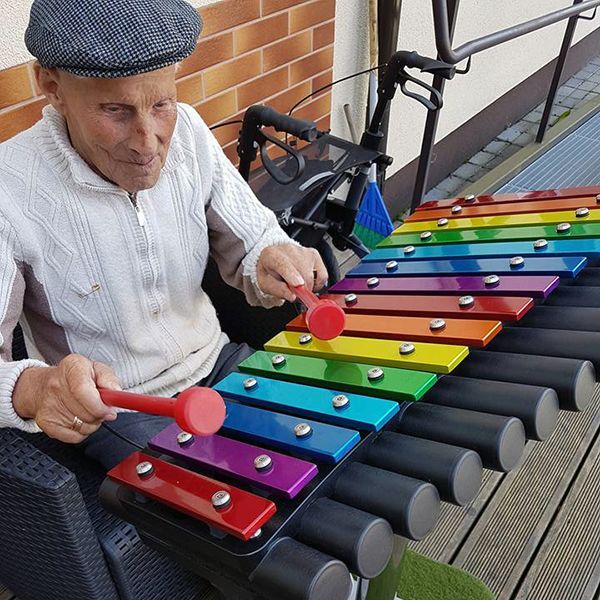
Let's Jam
Simply enter your name, email address, and click subscribe to get the latest product updates.
By clicking "Subscribe", you confirm that you have read and accepted our Terms and Conditions, Privacy Policy and Cookie Policy.
We recently released our Guide to Building the Perfect Musical Garden with tips on planning, planting and percussion. We want everyone to enjoy music and sound in the great outdoors. It’s free to download right now!
Everyone Can Enjoy Them There’s a preconception with the word sensory – it feels loaded. It’s as if it means “only for disabled people” or “only for children”.
Yes, sensory gardens offer a wider spectrum of stimuli than the binary audiovisual content most modern humans are used to consuming, but it doesn’t mean that they’re exclusive.
Quite the opposite, in fact. Sensory gardens are among the most inclusive places in the world, where anybody – young or old, regardless of ability – can be in tune with nature and interact with each other.
The vibrations of outdoor musical instruments can be felt as well as heard, adding new dimensions for deaf people and those hard of hearing. The smell of blossoming plants fills the air. Colours, textures, tastes – a sensory garden is a beautiful expression of what our world can give us.
The best part is that it takes absolutely no effort to enjoy. We’re hardwired, all of us, to seek out and devour sensory information. Without even realising it, we’re learning and communicating with each other and with nature.
Musical Sensory Gardens as a Unifier Whether or not we want it to, our society focuses on what makes us different rather than what makes us similar. New experiences, especially shared experiences, are great unifiers of people. Sensory and musical gardens allow people to focus on what they can share at that moment, on the senses they can experience at once, on the stimuli and learning they can collectively understand on a base, human level.
Musical Sensory Gardens as Therapy Musical therapy plays an important role in mental health (and even physical health). It can improve cognitive function, emotional development, social skills and motor skills.
Again, this therapeutic application isn’t limited to any groups of people – music therapy is found in almost every assistive and helping profession, from work with the elderly and rehabilitating stroke sufferers to addiction recovery and cancer treatment.
Musical Sensory Gardens are Fun! Enjoying something for the sake of it, with no rhyme or reason, is a long-suppressed human trait. We aren’t supposed to rationalise everything, because we’re emotional creatures. Our global cultures were all established on the foundation of our emotions – the analysis, reasoning and logic all came along later.
It feels good to let go. Don’t forget about fun, laughing and playing – it’s what makes us human! People build musical sensory gardens for the fun of others – their enjoyment and wellbeing. Human nature fills in the gaps; we learn, we experience and we grow without even realising it’s happening.